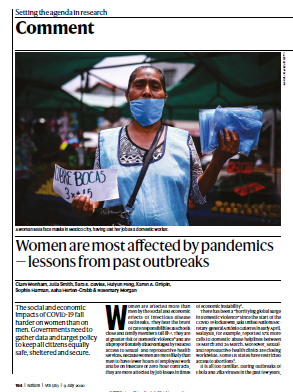Here, we call for COVID-19 research, response and recovery efforts that are tailored to support women. The three priorities are to tackle domestic violence; ensure access to sexual and reproductive health services; and support women’s livelihoods. We recognize that gender is neither binary nor fixed; that the pandemic differentially affects non-binary and transgender people; and that gender in global health intersects with other social stratifiers such as ethnicity and race, religion, location, disability and class. Therefore, beyond what we set out here, efforts to reduce the differential effects of COVID-19 must explore these intersections of marginalization and vulnerability.
Clare Wenham, Julia Smith, Sara E. Davies, Huiyun Feng, Karen A. Grépin, Sophie Harman, Asha Herten-Crabb and Rosemary Morgan (2020) Women are most affected by pandemics — lessons from past outbreaks, Nature, Vol 583, 9 July 2020






